
SALUTING MILITARY STUDENTS
CSU Global is on the front lines with academic programs and support
By Jenna Tarleton | Photography by Vance Jacobs | Feb. 13, 2023
IT WAS THE MIDDLE of the night several years ago when U.S. Army veteran Brian Bishop received a frantic call for help from the wife of a former military buddy. His good friend was suicidal.
While stationed in Germany, the two had built a close relationship and shared stories of their military experiences. Bishop learned his friend’s brother-in-law had also served and had been killed while deployed; Bishop’s friend had flown the body home.
Without tools to heal from the psychological trauma, his friend later turned to destructive coping habits, Bishop said. Substance abuse disorders can be relatively common in soldiers under intense stress and may contribute to suicidal thoughts. “We gripe, we hit the bottle, and we drive on,” Bishop said.
When Bishop got that call, he realized his friend’s pain had built to a crisis point. Bishop reacted by calmly and reassuringly talking with his friend until emergency services arrived. Later, his friend received the help he needed to recover and come back stronger.
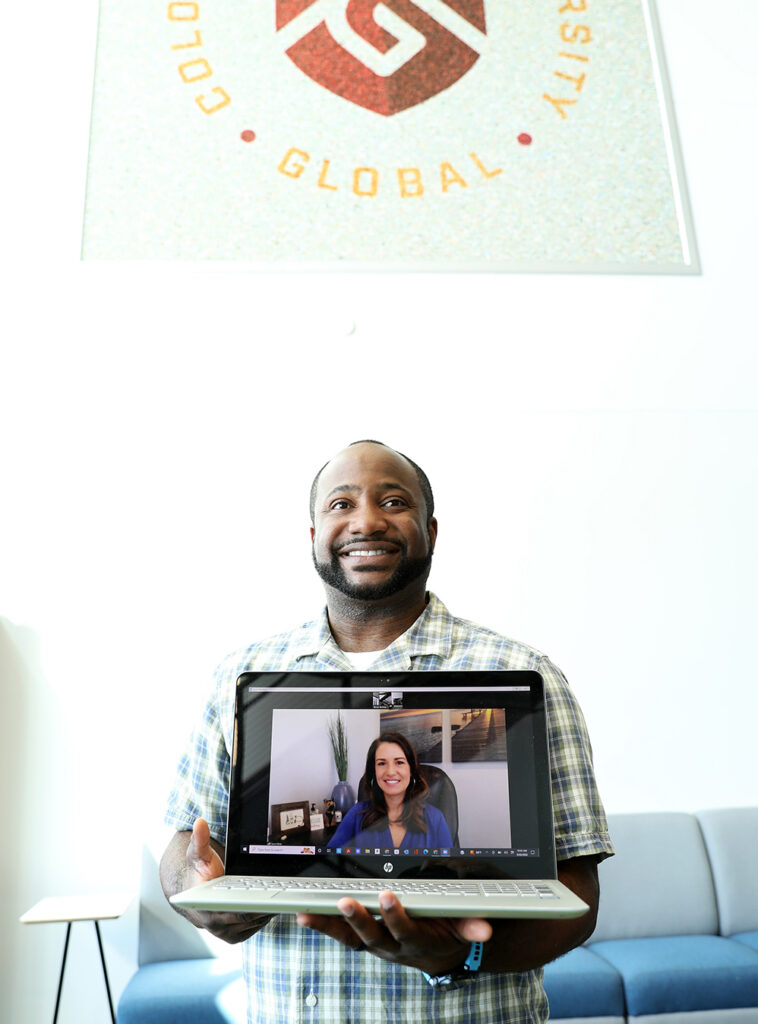

Brian Bishop, above and at top, is studying military and emergency responder psychology through CSU Global to help other military veterans and first responders develop healthy coping strategies after trauma. He meets with the program’s director, Dr. Sara Metz, by video.
The experience sparked a realization for Bishop: There is so much more we can and should do to equip military personnel and emergency responders with healthy coping strategies – so that when adversity and mental health challenges inevitably arise, people in these fields are better able to constructively respond.
His conviction is also based on personal experience. Bishop, 38, spent 12 years in the U.S. Army, including deployments to Iraq and South Korea. He served in combat and in the Military Police. He later developed an autoimmune disorder, myasthenia gravis, which may be linked to stress and anxiety. “I was running on level 10 stress every day during my time in service. I never had the right tools to check in and find better, more productive ways to actively recover and bring my stress levels down,” Bishop said.
Now, he is studying to contribute to improved mental health, wellness, and emotional resilience among military personnel and emergency responders. Bishop is pursuing a master’s degree at Colorado State University Global in a recently established program called Military and Emergency Responder Psychology, known as MERP. It is designed to prepare clinical psychologists to address the unique emotional and mental health needs of military and first responder personnel, for whom trauma and stress can be common. Bishop was introduced to the academic program through its director, Dr. Sara Metz, and her husband, Nick Metz, who own a Denver-based clinic, called Code-4 Counseling, which provides such services.
I was running on level 10 stress every day during my time in service. I never had the right tools to check in and find better, more productive ways to actively recover and bring my stress levels down.”
— Brian Bishop, student-veteran at CSU Global
Bishop already is well on a path to counseling psychology. He earned a bachelor’s degree in psychology from the U.S. Military Academy West Point and a master’s degree in sports and performance psychology from the University of Denver. In 2020, he launched a practice in Metro Denver called Armor, Equip, Empower Mental Performance. It provides performance-enhancing mental skills for the athletics, health care, and first responder communities; that includes firefighters, paramedics, emergency dispatchers, and law enforcement officers.
“Part of why I love the MERP program is I’ll take a course and can apply it in my next session with a client in real time,” Bishop said. “The interconnectedness between the path I’m on and being in this program combines so well.”
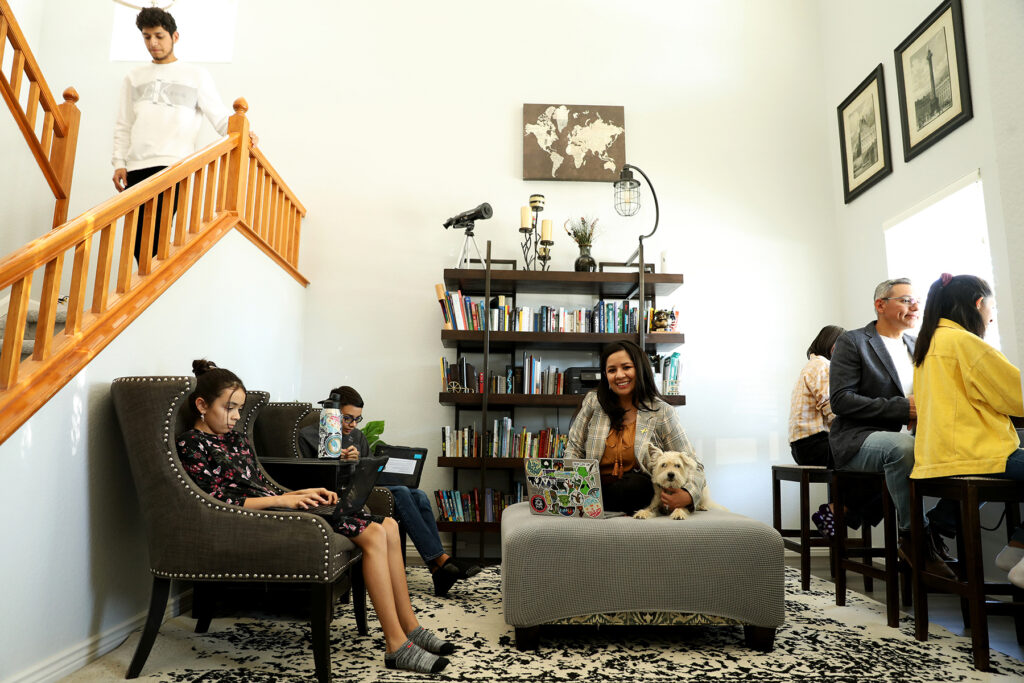
Sara Perez, a military spouse and mother of six, earned a degree in human services through CSU Global. She received a university scholarship for students affiliated with the military.
CSU Global is the nation’s first fully online nonprofit university with accredited degree programs; it was designed to help working adults attain credentials to advance in their careers. Its flexible structure, which allows students to complete course work at their own place and time, is a big plus for Bishop, who is getting his practice up and running even as he gains additional education and skills, he said. The university also is approved to accept military education benefits.
Beyond that, CSU Global has a number of specific programs to help students with military affiliations earn higher education credentials. And many with military ties find special connections with faculty members, nearly 20 percent of whom have served in the U.S. military.
CSU Global recently announced a further reduction in its discounted tuition rate for many students with military ties and their families: As of January, active-duty service members and their families receive a rate of $250 per credit hour for undergraduate programs, a discount of about 30 percent. The existing discount of 10 percent remains in place for student-veterans and their spouses and dependents. CSU Global’s student population includes more than 1,700 students with military ties, meaning about 13 percent of the university’s students may take advantage of these discounts.
In addition, CSU Global has a dedicated team of military benefits specialists who guide students in navigating federal assistance programs, offered through the Department of Veterans Affairs. CSU Global also waives application fees for active-duty service members, veterans, and military spouses.
Last year, such offerings helped CSU Global rank No. 6 in the nation for Best Online Bachelor’s Programs for Veterans, according to U.S. News & World Report. It was the only Colorado-based institution to earn a spot in the top 10.
When going back to school, I really had to consider an option that would work for me, something that I could do remotely and could travel with me. Military spouses are a very resilient and special community. Going to school is another challenge. But it is possible.”
— Sara Perez, military spouse and CSU Global alumna
Military students likewise find well-established and highly acclaimed programs at CSU and CSU Pueblo, making the CSU System a recognized network with academic programs supporting students with military ties.
Like Bishop, Sara Perez, a 36-year-old military spouse, landed at CSU Global in part for the flexibility and affordability it offers. That’s important to her, as a mother of six who knows moving is often part of military life. She also received CSU Global’s U.S. Military Personnel and Family Scholarship, which helped her attend school.
“Being a military spouse and a first-generation immigrant, there are a lot of challenges you come across, such as English being your second language and moving a lot,” Perez said. “When going back to school, I really had to consider an option that would work for me, something that I could do remotely and could travel with me. Military spouses are a very resilient and special community. Going to school is another challenge, but it is possible.”
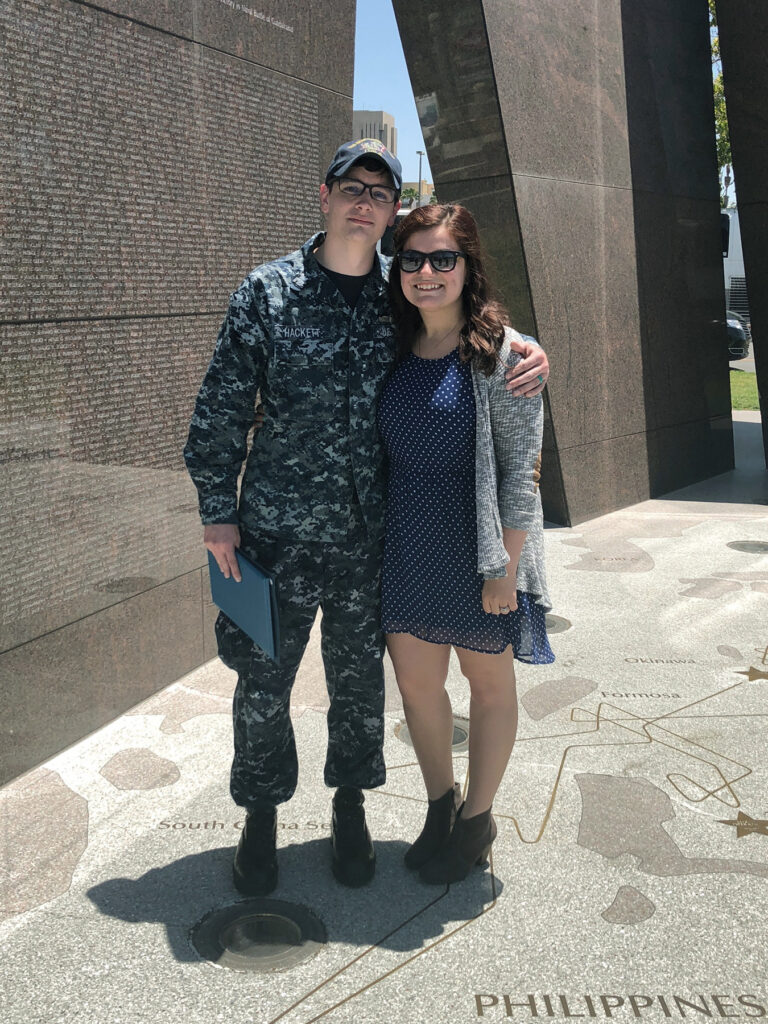
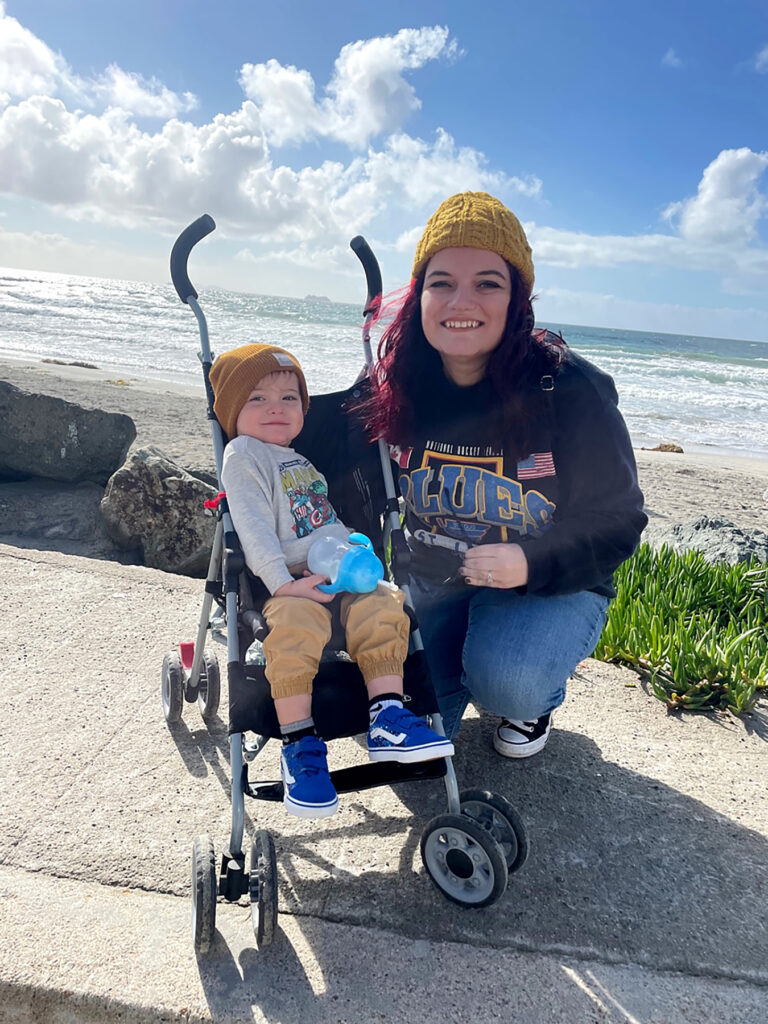
Kirsten Hackett enrolled at CSU Global while stationed with her husband in Japan, knowing she needed the flexibility of online higher education. The university has a policy that supports flexibility for military students.
Drawing on her experiences with the immigration system, Perez recently earned her degree in human services. She is a case worker for Arapahoe County and hopes to help children and teens in underserved communities find support and access to education. Her husband, Manuel Perez, a master sergeant in the U.S. Marine Corps, graduated from CSU Global alongside Sara with a B.S. in project management.
Alumna Kirsten Hackett sought an online program while she was living in Japan, where her husband was deployed. “Being in another time zone on a different continent, I knew I wouldn’t be able to be in class at a set time,” Hackett said.
The ability to pause course work also appealed to Hackett. CSU Global students may take a break in course work for up to 12 months and still remain in good academic standing. That option can help accommodate the unpredictable life of a military spouse – for instance, in the event of a move. The university’s Military Friendliness Academic Policy encourages students to reach out about their obligations so arrangements can be made to help them complete course work.

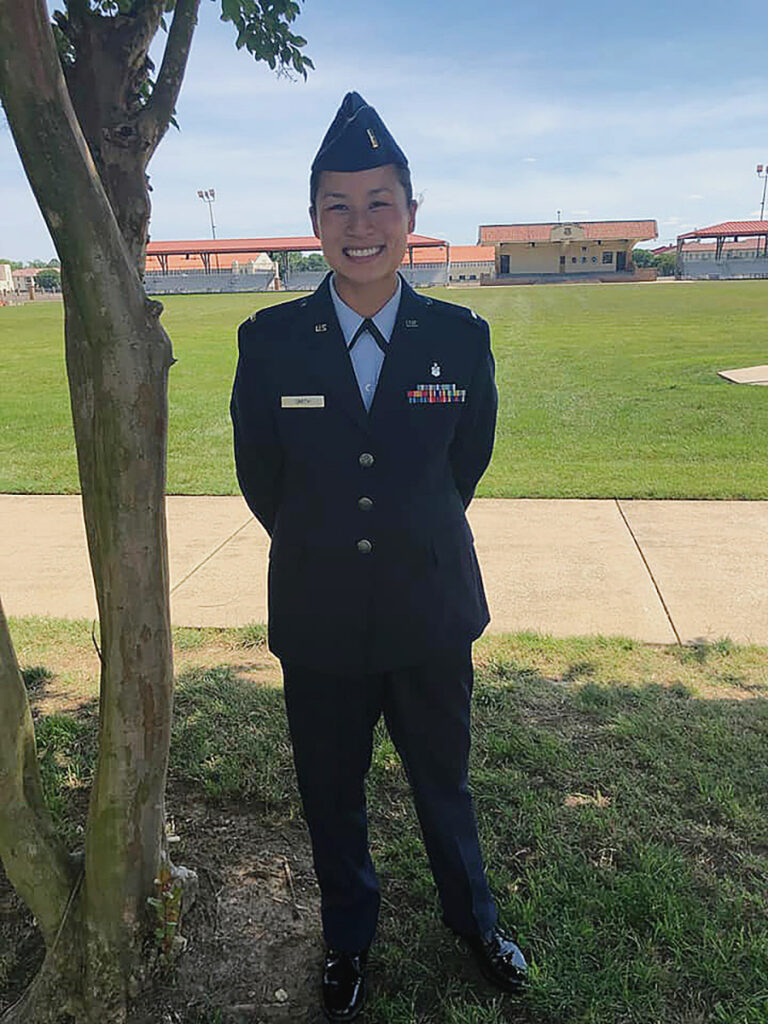
Rose Smith, former president of the CSU Global Student Veterans Organization, earned a degree in health care administration and management. The university’s credit transfer policy allowed her to start studies with nearly half her degree requirements completed.
Like many universities, CSU Global offers a Student Veterans Organization, in this case co-led by faculty member and veteran Jim Meredith and his wife, Stone Meredith. The organization is important in helping military students plug into an academic community.
“It helped me find my passion for leadership and helping develop other people, which was an incredible experience,” said Rose Smith, former chapter president. She graduated with a bachelor’s degree in health care administration and management and now serves as a readiness flight commander at Dover Air Force Base in Delaware.
Smith said she took advantage of CSU Global’s generous transfer policy, which accepts up to 90 credit hours from previous college studies, leading to faster and more affordable degree completion. With more than 50 college credits under her belt, Smith started at CSU Global with about half her degree requirements already complete, she said.
She was also able to maintain a full-time job. “As a reservist in the Air Force, you’re able to have a normal civilian job. Fixing medical equipment is a pretty hot job on the civilian side, so I worked as both a contractor for the Army, then Mayo Clinic, while also working part time for the Air Force Reserve,” Smith said. “I really enjoyed working full time, so I didn’t want to take time off to go to school full time on a traditional campus.”
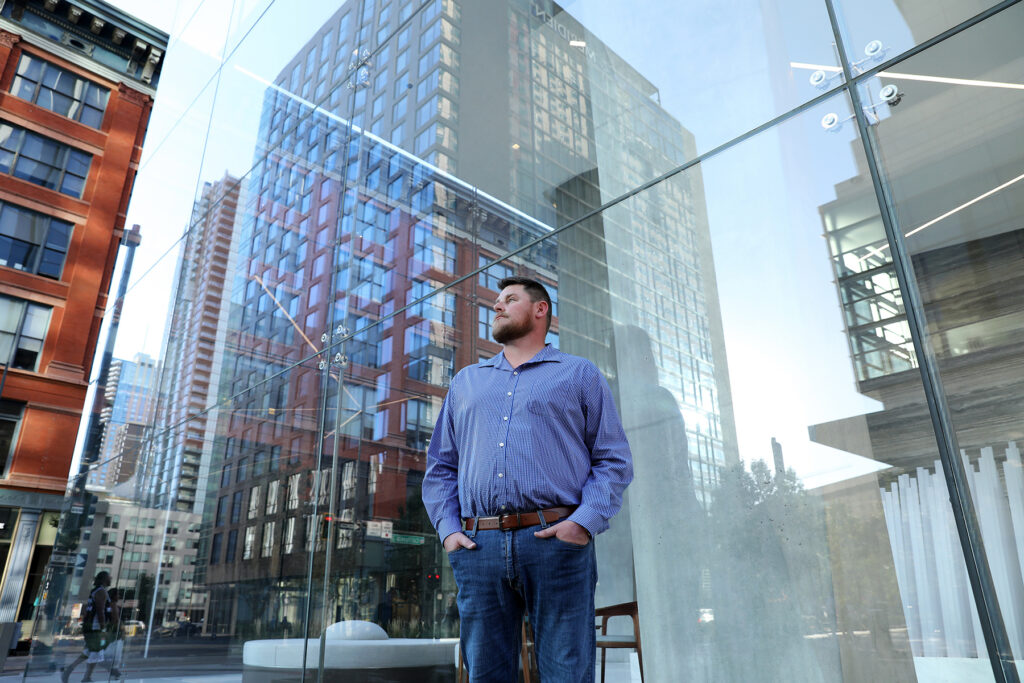
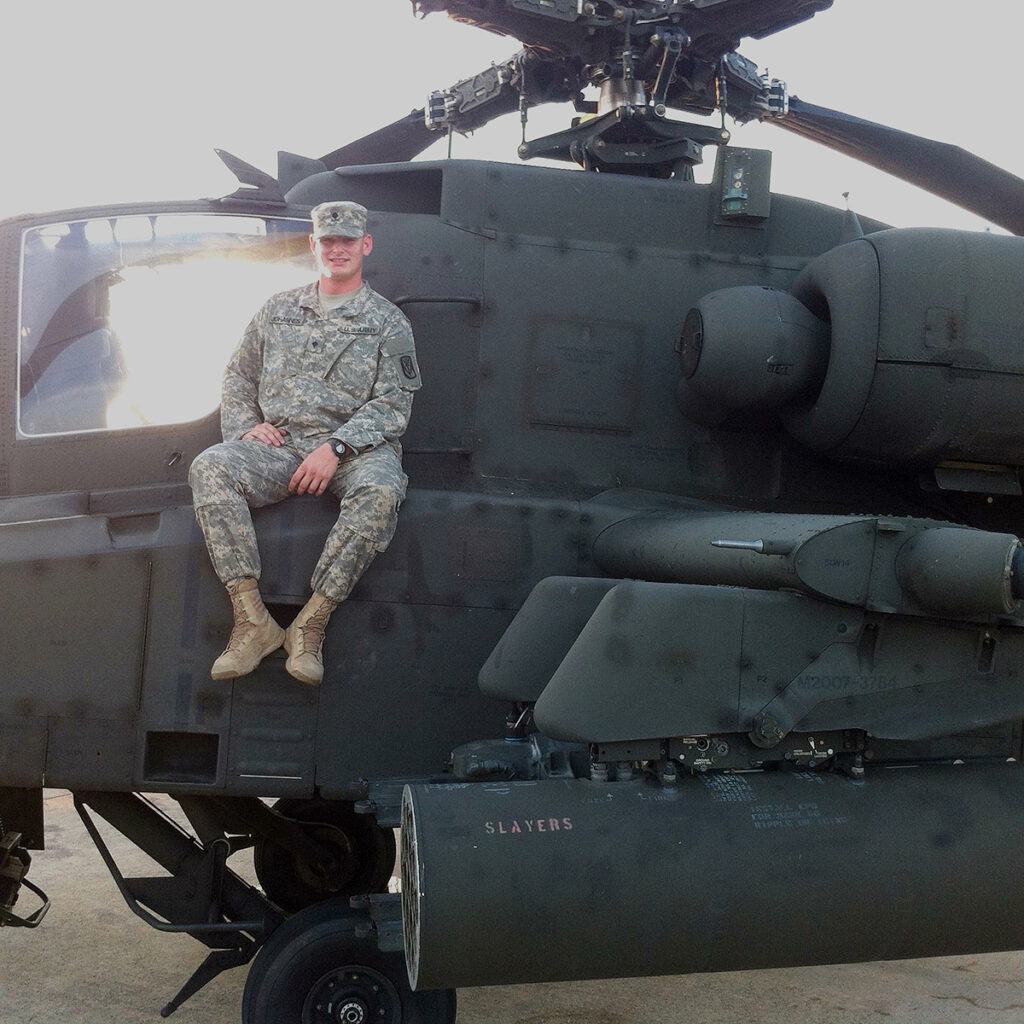
Aaron Johannes is president of the CSU Global Student Veterans Organization. Fully online course work has allowed him to start a career in the construction field while earning his degree. In fact, he worked on the building pictured behind him in Denver.
Aaron Johannes, current president of the Student Veterans Organization, said fully online course work has allowed him the ability to establish a career in the civilian sector.
“It’s the perfect curriculum for working adults,” Johannes said. Even more, the university’s industry-relevant academic programs allowed him to build on previous experience in the concrete business for a degree in project management, with a specialization in construction management.
Bishop said military experience helps students succeed. “I lean a lot on the tough situations I was in during my time in the military to keep me going when I hit a barrier,” he said. “Military service provides a lot of organization, planning, preparation, focus, and resilience that helps with higher education and work in the civilian sector.”
SHARE
